Past Event! Note: this event has already taken place.
Seeds, Food and Climate Resilience Seminar
March 26, 2024 at 3:00 PM to 5:00 PM
| Location: | 2017 Dunton Tower |
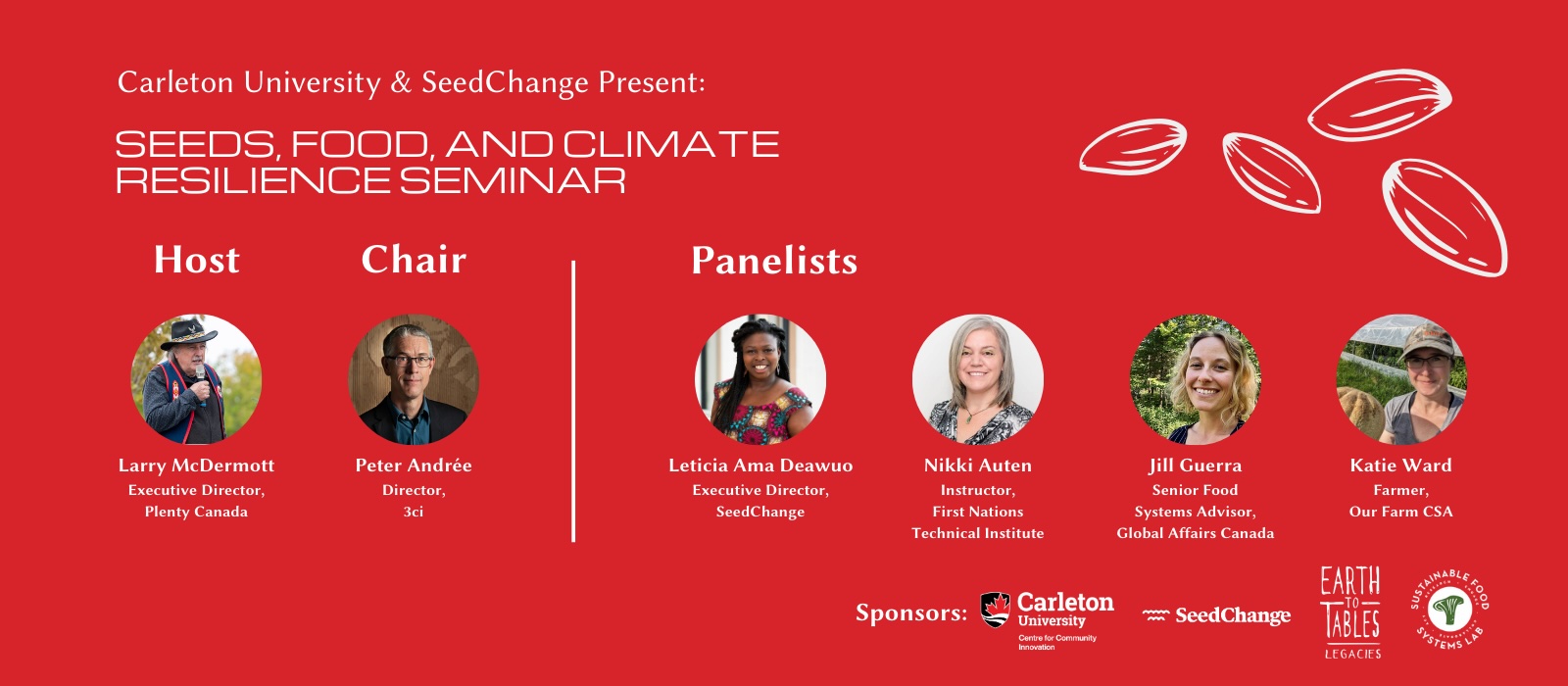
Or online via zoom.
Genetically diverse seeds, developed and maintained by Indigenous peoples and farmers over thousands of years, live at the heart of our food systems. The diversity embodied in seed and food system diversity are also key to resilience in the face of a deepening climate emergency. This seminar will explore the importance of seed and food system diversity in the face of climate change. Discussion will focus on the steps we can all take, in both policy and practice, as Indigenous Nations, NGOs, governments, farmers, and researchers, to maintain and strengthen this vital connection between people and the more-than-human world we are part of.
Featuring speakers from each of these communities, this seminar is also the Ottawa launch of the Earth to Table Legacies book, an intergenerational and intercultural exchange of knowledges and practices of food sovereignty.
A panel discussion will be followed by a Q&A.
Discussion topics will include:
- Indigenous seed and food sovereignty
- Seed diversity in Canada and the Global South
- Farming and climate change
- Aid policy for strengthening food system resilience
Land Acknowledement and Welcome
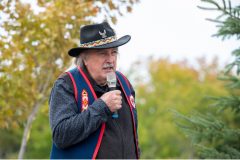 Larry McDermott, Executive Director, Plenty Canada
Larry McDermott, Executive Director, Plenty Canada
Larry McDermott is Algonquin from Shabot Obaadjiwan First Nation and is Executive Director of Plenty Canada. He is a member of the International Indigenous Forum for Biodiversity, the Ontario Biodiversity Council, the Ontario Professional Foresters Association, the Healing Place partnership, and the Niagara Escarpment Biosphere Network. McDermott is the former Mayor of Lanark Highlands, was a Commissioner for the Ontario Human Rights Commission, sat on the Ontario Species at Risk Public Advisory Committee, as well as provincial and national recovery teams for the American Eel. Larry also served as a comprehensive claim representative for Shabot Obaadjiwan First Nation, is a certified tree marker and butternut assessor, and holds other environmental certifications. He has also received an Honorary Doctorate of Laws from the University of Guelph. Larry was a humble student for many years of the late Algonquin Elder, Grandfather William Commanda, who created the Circle of All Nations organization. Larry lives in a 170-year-old log home on 500 acres of biologically diverse Algonquin land along the Mississippi River with his wife, Nancy.
Panelists:
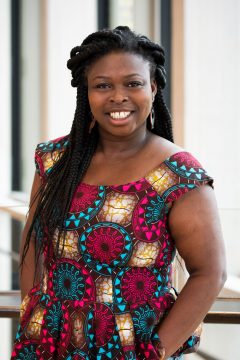 Leticia Ama Deawuo, Executive Director, SeedChange
Leticia Ama Deawuo, Executive Director, SeedChange
Before joining SeedChange as Executive Director in 2021, Ama spent fifteen years as a leading activist for food sovereignty and food justice, and four years as the Executive Director of Black Creek Community Farm, where she worked towards greater food justice with the Toronto community of Jane-Finch. She was instrumental in the creation of a number of initiatives in Toronto, including Jane Finch On The Move, Jane Finch Action Against Poverty, Jane Finch Political Conversation Café, Black Creek Food Justice Network, and Mothers-In-Motion. In 2022, Ama completed a Master’s Degree at York University, looking at how decolonization, agroecology, and the expertise of women elders in small-scale farming communities can support much-needed shifts in the way we think of our relationships with each other and with other living beings.
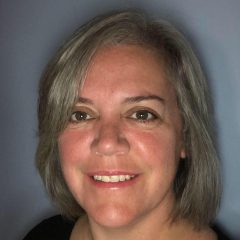 Nikki Auten, First Nations Technical Institute, Tyendinaga Mohawk Territory
Nikki Auten, First Nations Technical Institute, Tyendinaga Mohawk Territory
Nikki Auten is a proud mother of three beautiful children and tota (grandmother) of one. She is Kanyen’keha:ka (Mohawk), turtle clan from Kenhte:ke, also known at the Tyendinaga Mohawk Territory.
Nikki is a home gardener currently developing her growing and living spaces on 6 acres in Tyendinaga. She is actively involved in the Flint Corn Community Project, a Haudenosaunee Flint corn seed revitalization and rematriation project. This project has seen 6 landraces rematriated, two of which were direct descendants of the original donors of seed in the late 1980s. The other four were rematriated to their original community outside of the direct family.
Nikki is a founding member of the Kente:ke Seed Sanctuary and Learning Centre, which began in 2017. She had to take a couple of years off due to life circumstances, but is happy to have recently returned to this work.
Nikki considers herself a lifelong learner and has recently completed her Master of Arts in Sustainability Studies at Trent University. She also holds an Honours Bachelor of Arts in Indigenous Studies, a Bachelor of Education, and a Diploma in Kanyen’keha (Mohawk language), and a Diploma in General Business.
Nikki is currently employed as an Instructor at First Nations Technical Institute (FNTI). She also runs a part-time financial services business and volunteers in community at the KSSLC, Kawenna’on:we Immersion School and the Mohawk Agricultural Society when she is able.
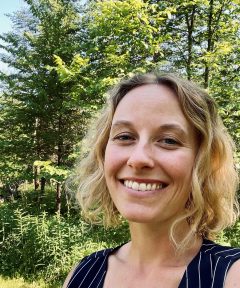 Jill Guerra, Global Affairs Canada
Jill Guerra, Global Affairs Canada
Jill Guerra has over 10 years of professional and academic experience advancing evidence-based agriculture and food systems policy, programming and research through international and domestic initiatives. Since 2019, she has been a Senior Food Systems Advisor at Global Affairs Canada (GAC) working within the international assistance portfolio. In this role, she provides policy and technical advice and co-manages a project seeking to deliver greater insights on Canada’s agri-food systems programming through artificial intelligence tools. She led the development of GAC’s new Resilient Agri-Food Systems Framework and coordinated Canada’s engagement in the UN Food Systems Summit. In other roles, she has led and advised on policy and research efforts focused on Canadian agri-food systems with the Canada Organic Trade Association, the Canadian Organic Growers, the Ottawa Food Policy Council and Food Secure Canada. Jill holds a B.A. from the University of Guelph in International Development and an M.A. from the University of British Columbia in Resources, Environment and Sustainability. Her thesis research explored the extent to which Brazil’s National School Feeding Program created incentives for family farmers to transition to agroecology and organic agriculture through enhanced market access and price premiums.
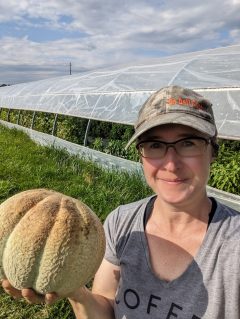 Katie Ward, OurFarmCSA
Katie Ward, OurFarmCSA
Katie Ward is a 9th generation family farmer from West Carleton-March, northwest of Ottawa. Along with her family, she raises pigs and chickens on pasture which she direct markets to her community along with growing vegetables and cereal grains. As a Past-President of the National Farmers Union and a current member of the Board of Directors of the National Farmers Foundation, she has a keen interest in food sovereignty, farmland preservation, and promoting equity in agriculture.
 Chair: Peter Andrée, Department of Political Science, Carleton University
Chair: Peter Andrée, Department of Political Science, Carleton University
Peter Andréeis a Full Professor in the Department of Political Science at Carleton University. He is cross-appointed in the Department of Geography and Environmental Studies and in the Institute of Political Economy. Prof Andrée’s research focuses on the politics of food and the environment. He practices, and teaches, community-based participatory research methods. He is the Director of the Carleton Centre for Community Innovation (3ci) and a member of the Participatory Food Systems Governance research team. His writings on seeds and food systems include Genetically Modified Diplomacy (UBC, 2007) and Civil Society and Social Movements in Food System Governance (Routledge, 2019). Prof. Andrée is a first generation immigrant to Canada from the Netherlands, and lives with his wife, Chris, and son, Nicolas, on unceded Algonquin territory alongside the Gatineau river in Québec.
Sponsors:
Carleton Centre for Community Innovation (3ci)
Earth to Tables Legacies project
Participatory Food Systems Governance Project
Registration is closed. We will be sharing our registration information with our partners for this event.